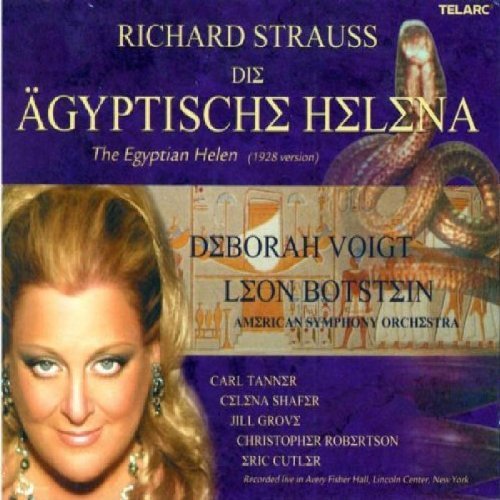Prelude
In bringing the rarely performed Richard Strauss opera Die Ägyptische Helena (“The Egyptian Helen”—last at the MET in 1928) back to the stage, the Metropolitan Opera is doing opera lovers a great favor. The music of this opera is marvelous, as most of even neglected Strauss is, and the opera’s story/libretto, maligned for being silly, incoherent, and whatever other damning thing one can throw at it, might just be worth our time, too. Nine years ago, Bernhard Holland wrote in the New York Times that “Richard Strauss gave Die Ägyptische Helena so many reasons to fail that its best qualities are neutralized, held hostage by its worst instincts. … [T]here exists so much in the opera’s favor, yet so much that almost guarantees its doom.” That was by way of introducing concert performances of the American Symphony Orchestra under Leon Botstein with—then as now—Deborah Voigt as Helena at Avery Fisher Hall that were widely considered a success, in part because they were not staged.
From the same venue and team, but five years later, comes the finest available recording of the opera. (By my count there are five performances on record—in various editions—only the 1970 RCA live recording from Vienna with Josef Krips, Edita Gruberova, Jess Thomas, Gwyneth Jones, and Peter Schreier is a serious alternative; Dorati / Detroit with Jones and Hendricks on Decca is oop.) The rest of the cast featured on that Telarc live recording, if more or less anonymous in late 2002, has all made their name in opera, since. Celena Shafer surely impressed everyone who heard her in the Washington Concert Opera’s performance of Massenet’s Esclarmonde two years ago. Carl Tanner—he’s been Samson for the WNO—has established himself firmly on the world’s opera stages (no more truck-driving and head-hunting for him…), Eric Cutler has since issued his debut recital on EMI, Jill Grove is in very good company as an ARIA winner (including Ms. Shafer and Mr. Cutler).
Story
But about that story: Poseidon’s mistress Aithra awaits her sea-ruling lover for dinner – in vain. (Poseidon is currently in Ethiopia.) Her omniscient clam (or mussel, although “mussel” and the German “Muschel” are not the same; the latter refers to the entire phylum of Mollusca, not just the class of Bivalvia) tells of a ship where a beautiful woman (the most beautiful woman, in fact) is about to be murdered by her jealous husband.
Aithra is appalled and prevents the murder by having the sea wreck the ship and the couple washed ashore. She receives Helen (just back from a ten-year stint with Paris in Troy) and her Spartan husband Menelas (just back from an equally long stint of destroying Troy and Paris) in her abode and sets about to fix that troubled marriage for Helen’s sake. The latter still loves Menelas, even if Aithra can’t understand what the woman finds in the aggressive boor.
Potions calm Menelas down—but he is haunted by visions of his less-than-ideally faithful wife (Menelas didn’t know Leonard Cohen, but he would have sympathetically hummed along to: “Everybody knows that you love me baby / Everybody knows that you really do / Everybody knows that you’ve been faithful / give or take a night or two * / Everybody knows you’ve been discreet / But there were so many people you just had to meet / Without your clothes / And everybody knows”) and promptly runs amok. Aithra’s fairies distract him and, confused, Menelas thinks he is killing Paris and Helen all over again as he stabs at the conjured spirits. (* Or 3652, as it were)
Now Aithra tells him that Helen was never actually in Troy—but that a spirit had been created in her image to protect the real Helen who was sound asleep all that time, safely tucked away in Egypt. (This is actually one of the variations of the myth, but with Hofmannsthal and Strauss it’s just that: a cockamamy scheme to help Menelas reconcile Helen’s true love for him with her alleged (actual, but now appearing never-to-have-happened) marital transgressions. (After Paris’ death she was handed from brother to brother… “A sister-in-law unlike any other” Menelas points out, with sarcastic disdain.)
That seems to be the solution at first, and Helen asks to be ferried (fairied, to be precise) away to a secluded place where she can sort things out with her hubby. Soon she realizes that Menelas’ forgetting the past (supported by more potions) does not actually help. Now the quarrels are just different—and the newly reunited couple finds itself in a union that is not really themselves. A foreign prince and his rash son (Altair and Da-ud) crash the party, create diversion, but don’t propel the drama. Helen decides that in order to save her real marriage she must risk having Menelas remember everything—and gives him a potion to that effect. With that act she also allows Menelas to come to the difficult terms of how his beautiful loving wife could be the same one that ran away with Paris, leaving him with their daughter behind and causing a long, bloody war. In overcoming this discrepancy, an actual reunion is possible and the opera ends on this hopeful, but unresolved, and hardly definitively happy, note—not unlike Così, Der Rosenkavalier, or Capriccio.
If this (and numerous fairies and acts of magic and some summoned sea-warriors of Poseidon) sounds ludicrously “out there”, it’s probably because the surface of the story can all too easily detract from its substance. At the heart of Die Ägyptische Helena is a (nearly) as domestic a story as in Intermezzo (another obscure opera of his—see table to the left) or, non-operatically, in the Sinfonia Domestica.
Meaning
It’s a beautiful and sensitive problem and predicament that Strauss and Hofmannsthal tackle: That of the difficulties of reconciling the seeming inconsistencies and contradictions of reality (in spouses or elsewhere); the reality of the people we interact with and the ideal we may hold of them. Often we simply deny this discrepancy; others react with violent outbursts to them. (A rather crass label for this conflict is the “Virgin Mary / Whore complex”.) Anyone who has ever been in a relationship will have done or thought something they know is better not shared with the respective partner. (“Your thighs are fat”, “That guy is really hot”, “I wish your mother finally died”, “No, actually the soup is execrable”, “You’re not the best I’ve had” etc.)
At the same time we run around denying our partners might think similar thoughts or do similar deeds. When we can’t brush that inconsistency under the carpet anymore, we might be in trouble, just like Menelas, who can’t deny that half the Trojan royal family had a go at Helen. (What kind of a role model would she be to our daughter, he thinks.) Understandably it takes him a while to integrate that person with the Helen he loves and knows and who loves him… and then accept her as that, in all her complexities.
Even if you don’t buy that the glaring discrepancy between the two acts of Strauss’ opera—the comedic, silly first act and the relatively serious drama of the second act—represent in form the very psychological discrepancies the characters have to overcome, the subject matter alone deserves more benevolent attention than the easy mockery that it usually meets. Sure, it’s easy to claim silliness starts with the first line, “Dinner is served” in the MET-titles (it’s actually “The meal is prepared” or “The feast awaits… night is falling”), but that is in any case no less meaningful a way to start an opera than using the lines: “Five… Ten… Twenty… Thirty… Thirty-six… Forty-three”—and amounts to little more than taking potshots at poor Helena. Most of the absurdity in it merely serves to illustrate this very human, very bourgeois and near-universal condition.
Staging
If taken as the silly, hopelessly weird opera that it is generally thought of, a new production might well be tempted to go all-out absurd and completely ignore or obscure the central theme. David Fielding, who updated his 1997 staging from the Garsington Festival for the MET, does not fall victim to that temptation. His set is wild, abstract, and a good many of those things that have MET patrons cringe, but it never distracts, often adds subtly to the drama (while looking unsubtle on the outside—not unlike the opera itself). Acts I and II are visual inversions of each other—what is white in act I is black in act II, what was stage left in act one is now stage right. The sets are gorgeous, skewed and abstract contraptions of oversized doors and walls. A number of inspired touches makes this opera a visually most arresting feast for the eyes of those that don’t expect traditional settings. But why would anyone care about representational sets when the story of the opera has so little to do with the actual drama, anyway? The direction of the green fairy-chorus (a weird alienesque bunch of glittering things, somewhere between lions and Liszt-monkeys, in mint-mouthwash colored vinyl dresses) is delightful and surprisingly in line with the text. (When they can’t take the radiance of Helen’s beauty, why shouldn’t they take out their glacier-goggles?)
The Music
Helen might be Clytemnestra’s sister (both hatched from eggs after Zeus raped/seduced their mother with at least one of them having been in the form of a swan… the accounts vary on this)—but Strauss’ 1928 opera sounds much more like Salome than Elektra, shot through with the harmonic and orchestral language we might know from later works like Die Frau ohne Schatten (1919) and Arabella (1933). The music is gorgeous far beyond what one might expect for an opera of such ill repute (even if, admittedly, no one ever claimed that it was neglected because of the music). Hugo von Hofmannsthal, who wrote the libretto for Helene (as he did for Elektra, Der Rosenkavalier, Ariadne auf Naxos, Die Frau ohne Schatten, Arabella, and Die Liebe der Danaë) wanted Strauss to get away from Wagnerian “erotic screaming” (Frau ohne Schatten, anyone?), and while that goal was achieved, there are still a couple of orchestral moments in Helene that bring Die Walküre and Das Rheingold to mind. This is music to indulge in and it gives the two leading sopranos more wonderful opportunities to show off their ability (athletic and bel canto, alike), sensitivity, and vocal voluptuousness than other composers manage to offer in their entire œvre’s output.
The Singing
The Met cast offers several reasons to tune in on Saturday, but none greater than the spectacular Diana Damrau and Deborah Voigt. The latter sang more than admirably despite having been announced “ill” by Peter Gelb. A speckle on the very first note and slight metallic restriction that loosened as the opera went on were the only notable results of that illness in the first act. An odd, but isolated, metallic buzzing (like a blown tweeter) when she was at her most forceful in the “Zweite Brautnacht, Zaubernacht” opening of act II was the only other moment when her incapacitation called attention to itself. Her Helen was still a vocal feat and feast, and to hear her—hopefully—in full health on Saturday (1.30 PM) should prove even more rewarding. Sadly not visible on the radio, she now even believably looks the part of “most beautiful woman in the world”!
Her Helen was bettered only by Aithra with her more agile part—brought to life in every way by the German soprano Diana Damrau. With diction as perfect as her natural pronunciation, she also added a theatrical element to her use of language. An actor could not have treated language more appropriately than she. And while this might be a detail lost on all but those who follow the libretto by listening to it, her vocal contribution escaped no one in the house, which went (comparatively) wild at curtain call. Indeed, Ms. Damrau must have momentarily forgotten that she was not the top-billed singer and last to take a bow, because she started to order her colleagues together for the group-bow before realizing that Ms. Voigt and Torsten Kerl (Menelas) had yet to appear. A very cute (and on that night truly forgivable) faux pas.
Under Fielding’s direction, said Torsten Kerl came across like Alec Baldwin in one of his slightly absurd, over the top performances. He lacked the power to compete with the ladies, seemed at his limit throughout the first act (never strained but never easily cutting across the orchestra, either) – but came to life mid-second act. Jill Grove repeated her clam/mussel from the 2002 performance and recording with maturity and a deep, molluscan beauty. Wolfgang Brendel brought his veteran but unreliable baritone to the part of prince Altair and surprised with a big and round, largely wobble-free delivery that belied recent experiences I have had with him.
Altair’s son, Da-ud, was sung by Texan tenor Garrett Sorenson and it was never in question why he had previously been given seven other roles at the MET. He’ll get more, still, judging by what he made of this small part. The chorus was fine – but acted even better. Only the Met orchestra under Fabio Luisi (who so had magnificently conducted Simon Boccanegra) left something to be desired. Best when sweeping and impetuous, there were some problems in the delicate (and already oddly tuned) string passage accompanying Aithra’s “Ihr grünen Augen” and the ensemble seemed to drift apart a little in the first act.

Follow @ClassicalCritic




No comments:
Post a Comment